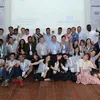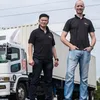Startup Guide Singapore: how entrepreneurs leverage this regional innovation hub
'Startup Guide Singapore' covers emerging startups, accelerators, coworking spaces, and supporting institutes in Southeast Asia’s startup hub.
The Startup Guide series of books, launched in 2014 by Copenhagen-based publisher Sissel Hansen, covers over 20 cities such as London, New York, Paris, Stockholm, Lisbon, and Miami. See our reviews of the guidebooks for Berlin, Munich, Zurich, and Johannesburg.

Startup Guide Singapore is spread across 235 pages and makes for an informative and entertaining read, with profiles of founders, co-working spaces, investors, educational programmes, and other ecosystem players.
Singapore is well known for its business-friendly policies and a slew of government funding schemes to support entrepreneurs, Sissel begins. The city-state and island country is a major financial centre, the Asia-Pacific headquarters for a number of global players, and a startup launchpad for the Southeast Asia region.
Real estate services company Colliers ranked Singapore as the second best place to start a tech operation in Asia, behind Bangalore. Startup Genome ranked Singapore among the top 12 startup hubs globally, with over 4,300 tech startups. Though a small country of 5.6 million people, it has invested heavily in its Research, Innovation and Enterprise 2020 plan.
Venture capital investments in its startups increased from $136.4 million in 2012 to $1.37 billion in 2017, according to Edwin Chow, Assistant CEO, Enterprise Singapore. Local firms such as Changi Airport Group, ST Engineering, and Zicom MedTacc have tapped the local startup ecosystem, in addition to a range of MNCs.
Enterprise Singapore launched the Startup SG initiative in 2017 as a single platform for startup information and community connects. The Global Innovation Alliance was introduced in 2017 to connect ‘the Little Red Dot’ with other global startup and innovation hubs.

Overview
The book begins with an overview of Singapore facts and necessities such as ease of doing business (second in the world, according to the World Bank), support for women entrepreneurs (fifth best in the world, according to MasterCard), multiculturalism (melting pot), living costs (expensive), cuisine (foodie’s paradise), alcohol (expensive; sixth most expensive city in the world for beers), people (respectful), tax authorities (most efficient), public transport (efficient, affordable), and language (English, Singlish, and others).
Singapore allows a foreigner to own 100 percent of the stock of a Singapore-incorporated company. Around 30 percent of the population consists of expats. Anti-corruption and IP laws are strictly enforced.
Singapore is home to multiple unicorn startups, such as Grab, Lazada, Razer, Sea, and Trax. Recent successes in funding rounds have been announced by local startups such as lifestyle-based app Carousell, insurtech company CSX, AI-driven storytelling platform Nugit, and gaming startup Sea (formerly Garena).
The median age of Singaporean entrepreneurs is 28 years, the youngest globally. Singapore also plays host to prominent startup events and conferences, such as InnovFest Unbound, Slush Singapore, and Singapore Week of Innovation and Technology (SWITCH).
I. Startup profiles
One section of the book profiles 10 startups based in Singapore. They include CrowdFarmX (smart farming solutions), Hmlet (co-living space), Next Billion (rural digital marketing insights for FMCG companies), Ocean Protocol Foundation (blockchain solutions), and SDI Academy (language and socialising skills for migrant workers).
Emporio Analytics provides big data insights on better shopper experiences for retailers via personalisation and relevant offers. Its clients include Unilever, Nestlé, SPAR and AEON, and it plans to target local mom-and-pop shops across the region as well.
Jumper.ai is an ecommerce enabler that allows merchants to directly sell products on social media. Its clients include Disney, Unilever, and Toyota. Evie.ai provides AI solutions for office work, ranging from scheduling meetings to customer service. The National Gallery of Singapore is one of its clients.
Funding Societies is an SME digital-financing platform for SMEs in Singapore, Indonesia, and Malaysia. Finances are crowdfunded by individuals and institutions.
WateROAM is a social enterprise that develops portable water filtration systems in rural areas and disaster zones. It is based on a membrane system and a hand pump, requiring no electricity. It works with Red Cross Singapore and World Vision, and has served 70,000 people across 21 countries.
Many of the above startups have benefited from startup competitions such as Crossing the Chasm and the DBS-NUS Social Venture Challenge Asia. Others have been supported by incubators at NUS, NTU and PayPal.

II. Startup ecosystem
Two sections of the book profile the support system for startups, ranging from coworking spaces to programmes at incubators and accelerators. For example, the NUS Startup Runway programme is an incubation and acceleration programme offered by NUS Enterprise, the university’s entrepreneurial arm.
Antler is an early-stage VC looking for “daredevils and creative thinkers”. According to Southeast Asia Managing Partner Jussi Salovaara, the antler metaphor refers to moving “onward and upward and forking to different directions”.
It has programmes in Singapore, Stockholm, Amsterdam, London and Sydney. For a five-month accelerator programme, Antler invests up to S$100,000 for a company valuation of S$1 million.
Entrepreneur First is a talent investor focusing on sectors like deep tech. It looks for entrepreneurs with “unfair competitive advantage”, which it calls the “Edge”. Its six-month programme has graduated more than 150 startups across its hubs in London, Berlin, Paris, Singapore, Hong Kong, and Bangalore.
The SAP.iO Foundry accelerator programme connects early-stage startups to SAP and its global customer base. The program launched in 2017, with branches in San Francisco, New York, Berlin, Paris, Tel Aviv, Tokyo, and Singapore.
The SAP Next-Gen platform focuses on startups addressing the UN’s 17 Sustainable Development Goals (SDGs). Its network spans 3,700 educational institutions and 130 labs in 117 countries.
Startup Station Singapore, backed by Facebook, Singapore’s Infocomm Media Development Authority, and innovation consultancy Rainmaking, supports startups working on data-centric solutions.
The Unilever Foundry platform connects Unilever’s many brands and business units to tech startups. Co-working space LEVEL3 was formed by Unilever Foundry and Padang & Co. It is home to 65 startups and eight corporate partners: Unilever, WPP, Cargill, MUFG Bank, Syngenta, Microsoft, Deloitte and STMicroelectronics.
“We believe that the world’s ‘billion-dollar problems’ cannot be solved by individual organisations but rather through collaborative innovation,” says Adam Lyle, Executive Chairman, Padang & Co. LEVEL3 hosts MUFG Bank’s Digital ASEAN Programme, which has launched an agritech accelerator.
A range of other co-working spaces is active in Singapore, such as BLOCK71, initiated by NUS Enterprise. It was launched together with Singtel Innov8, and startups such as Carousell and 99.co began here. BLOCK71 has locations in China, the US, and Indonesia as well.
Trehaus, which combines the Spanish word for three (tres) with the German word for house (Haus) is a unique coworking space for working parents. Its cofounders met at a women’s networking event. Other co-working spaces include Collision 8, Found (which also runs seed fund Found.Ventures), Working Capitol, and The Hive.

III. Expert insights
One section of the book provides expert tips from accelerators and startup consultancies in the city. The advice covers customer engagement, marketing, sustainability, and talent.
MING Labs is a global digital venture builder with a strong focus on design. “Start by getting out of the building and interviewing at least 10 target customers. Learn about their needs, pain points, motivations, and behaviours,” advises Sebastian Müller, Co-founder and COO of MING Labs.
Many founders do not fully understand their target customers’ needs or may not have clearly defined the problem. “Validating the prototype with real customers will help reduce risk during the production process and move your solution in the right direction,” Sebastian advises. The firm has offices in Singapore, Shanghai, Berlin, Munich, and New York, with clients such as BMW, BOSCH, Lufthansa, and Siemens.
“Startups play a significant role in Singapore’s economy,” says Jonathan Lim, director of Global Innovation Network at Enterprise Singapore. “It is vital that we do not merely build up our competencies in silos but that we bring them together to form an active knowledge economy,” he adds, urging founders to attend events and conferences for peer connects and learning.
Cargill, a LEVEL3 partner for co-innovation with APAC startups, launched Cargill Digital Labs (CDL) to prepare for the digital future. It has invested in startups like New Mexico-based Descartes Labs (satellite imagery for agriculture) and Dublin-based Cainthus (facial recognition on cows).
“Be purpose-driven and start with a problem statement that addresses the challenges faced in the food industry,” advises Kin Wei Soh, Chief Information Officer, APAC, Cargill. Cargill is also a co-sponsor of the Techstars Farm to Fork Accelerator.
“The speed at which things happen here is what makes Singapore so special for entrepreneurs from a legal and business perspective, especially if you compare it to other countries in Asia,” observes Birgitta von Dresky, Partner, Luther LLP.
“Define founder roles and responsibilities from the very beginning,” she advises. Founders should turn to outside experts for tasks like accounting, tax compliance or writing up contracts.
Hotel G Singapore has partnered with events such as Singapore Design Week and the Singapore International Film Festival. It also supports local artists via the platform RCGNTN and e-commerce brand Kai to host events, gallery openings, and pop-up stores.
“The hospitality industry can be traditional, but there is huge potential for modern technology to move the industry forward,” observes Othmane Amrani, GM. “Don’t be afraid to say no to suggestions that don’t align with your business strategy,” he advises founders.
KPMG Digital Village was launched to connect corporations, startups, and governmental bodies for co-innovation across the public and private sector. It advises founders to have patience in understanding and navigating the hierarchy and bureaucracy of corporate customers.
“Embed purpose into your business. Combine open collaboration with local flavour. Connect with government leaders working on initiatives linked to the SDGs,” urges Ann Rosenberg, Senior Vice President and Global Head of SAP Next-Gen.
Ann has written a book on Innovation 4.0, titled Science Fiction: A Starship for Enterprise Innovation. “It’s time to activate your inner science-fiction mindset for innovation with purpose,” she advises.
For Ann and SAP Next-Gen, Singapore is something of a “science-fiction city.” Innovation 4.0 is an approach combining science-fiction thinking with the SDGs and exponential technologies to reimagine industries and enterprises.
IV. Founder advice
One section of the book interviews founders of five startups, tracing their entrepreneurial journeys, advice received, lessons learnt, and tips for the next wave of aspiring entrepreneurs.
French serial entrepreneurs Alexia Sichère and Maëlle Pochat have launched three startups: FoxySales (online flash sales site for parents and children), Wanted Labels (platform for online popup shops for fashion labels), and Try and Review (neutral platform for product trials and reviews).
Try and Review covers everything from snacks and beauty products to luxury goods and electronics. It works with brands such as Unilever, Nestlé, and L’Oréal, and has a database of over one million testers in more than 10 countries.
“Be able to continuously adapt your product to the market and continuously innovate,” Alexia advises. “Starting a second business is always easier because there are many mistakes you make in the first one that you don’t make anymore, and things really move faster,” she adds.
Anna Vanessa Haotanto founded women’s financial investments platform The New Savvy. She was one of the pioneer heads of the Singapore FinTech Association, and President of Singapore Management University Women Alumni.
Her site delivers content through education, media, and conferences, and offers tools for financial planning such as savings, buying property, and investments. “We are also organising our first large-scale conference called the Future is Female,” Anna adds.
But her journey was not easy. “I was giving up a good five-figure income and some people told me not to be naive and to stick with a real job,” she recalls. “I think I made every mistake that could have been made. But that’s life, isn’t it? You falter, but you pick yourself up,” she adds.
“Passion might not be enough. I think what is more important is to combine the passion with a systematic process to ensure that your idea is executed well. Sometimes, you also have to depend on timing and luck,” Anna suggests.
“I find that Singapore still lacks an entrepreneurial environment and spirit, because we are very comfortable,” she cautions. “There is still a stigma attached to failure here, and maybe that’s stopping people from stepping out into the entrepreneurial world,” Anna observes.
Elena Chow had a long career in HR at P&G, and then founded talent solutions firm ConnectOne for the tech sector. “Between pleasing the investors and leading the team, you need to learn as well,” she advises founders.
Such learning comes from mentors, reading, and peer circles. “Most young Singaporeans have a very clear career path. Entrepreneurship is not a popular path; it’s not seen as desirable compared to a corporate career,” she observes.
Ho Jia Jian and Derek Tan were engineering students at NUS, where they ran a film club. They founded Viddsee as a video platform highlighting the work of Asian content creators and storytellers. It helps media entrepreneurs sustain the audience beyond the initial burst of customer views.
“There’s so much that a culture that’s built on strong foundations can do,” Jian advises. “Our worst decisions were thinking you can do everything as a founder and not delegating by undertaking too many responsibilities,” he recalls.
The startup has expanded to Indonesia, Malaysia, and Philippines. Having a Singapore base helps with business credibility in meetings around the region, he observes.
Jian regards being a generalist and intrigued by everything as one of his skills. “Kind of a Jack of all trades but master of ‘some,’” he jokes.
Stephanie Crespin is the Founder and CEO of StyleTribute.com, a boutique online marketplace for secondhand luxury fashion. Her second startup, Reflaunt, works with brands to build circular ecosystems in the fashion industry, blending style with environmental consciousness.
Actual discussions with customers helped her overcome assumptions that Asians only liked new products and regarded used products as unhygienic; the savvier younger online generation did not have such barriers. Iteration and agility are key in this regard. “It’s not a customer’s job to know what he wants,” she evocatively describes.
It is always important for entrepreneurs to keep reframing their outlook and aspirations in the course of their journey, Stephanie advisees. She says the most valuable piece of advice she had been given is: Don’t be embarrassed by your first draft.

V. Schools
One section of the book describes educational and skilling support for entrepreneurs in Singapore. For example, Singapore Institute of Management (SIM), founded in 1964, launched Platform E, a non-degree entrepreneurship programme in 2016. It looks for “intellectually curious entrepreneurs” who are coachable.
NUS has study-abroad programmes at more than 300 universities across 50 countries. Its entrepreneurial arm is called NUS Enterprise. Students are automatically eligible for the university’s Continuing Education and Training course upon graduation, so that they can upskill whenever necessary.
Singapore Management University (SMU), founded in 2000, runs the Institute of Innovation and Entrepreneurship, a student-managed VC fund, and one of the biggest university startup challenges in Asia. It nurtures entrepreneurs to “be intellectually curious and think critically”.
Singapore University of Technology and Design (SUTD), founded in 2010, runs the SUTD Technology Entrepreneurship Program (STEP). Students are expected to submit design projects at the end of every course.
With campuses in France, Singapore, and Abu Dhabi, INSEAD provides a global perspective on entrepreneurship. There are courses on Value Creation in Luxury and Fashion, Startup Boosters, and Artificial Intelligence Strategy for Startups. There is also the student-led INSEAD Entrepreneurship Club.
General Assembly (GA), founded in New York in 2011, offers digital upskilling programmes at 20 campuses worldwide, including Singapore. “Attendees are required to take in and apply feedback. This can be particularly challenging for professionals after years in a different career,” cautions Aziza Sheerin, GA Singapore Regional Director.
VI. Investors
The final section of the book profiles active investors and their startup portfolios. For example, Golden Gate Ventures has invested in more than 30 companies in Southeast Asia, such as mobile classifieds platform Carousell and caregiver marketplace Homage.
“We like large, fragmented markets with smaller competitors where tech-first solutions can disrupt and build large customer bases,” says Founder Vinnie Lauria.
Protégé Ventures, a joint initiative between Kairos ASEAN and Singapore Management University, invests up to S$50,000 in early-stage startups with a student or recent graduate in their management team. “We believe that outstanding founders display exceptional entrepreneurial traits from a young age,” says Founder Lujie Chen. The company is on the lookout for the “next Snapchat and Facebook”.
SAP.iO Fund invests in early-stage startups that can leverage SAP technology. “We focus on early-stage startups because we believe that with technology, a small input can drive a lot of output, which is a testament to the small startups that are changing the world, hence the little ‘i’ and big ‘O’ in SAP.iO,” says Ram Jambunathan, SVP, SAP.iO.
The fund generally invests alongside other Tier-1 VCs, who will lead or co-lead a round. Much of the innovation that is driving new enterprise intelligence is happening in the startup ecosystem, according to Ram.
SeedPlus, founded in 2015, invests from S$500,000 to S$1 million in seed rounds. Its partners include Gabriel Lundberg, who worked at Spotify, and Tiang Lim Foo, who worked at Evernote. SeedPlus has invested in 15 companies, including EngageRocket (automated employee feedback) and Homage.
VisVires New Protein (VNP) invests $1 million to $4 million in food industry startups that are improving the food-supply chain. “Two-thirds of the world’s population lives in Asia. Finding solutions towards more sustainable food consumption in the region will have global impact,” says Matthieu Vermersch, Founder at VNP.
Wavemaker Partners, dual-headquartered in Los Angeles and Singapore, has invested in over a 100 startups in Southeast Asia, largely in enterprise and deep technology. These include Silent Eight (AI solutions to combat money-laundering), Structo (3D printers for dental applications), and Zilingo (fashion marketplace).
Wavemaker is the regional partner for the Draper Venture Network, the world’s leading VC collective comprising 10 firms across five continents. Wavemaker Southeast Asia is headed by Paul Santos, whose investments include cosmetics marketplace Luxola (acquired by LVMH), influencer marketing platform Gushcloud (acquired by Yello Mobile), and work-chat app Pie (acquired by Google).
The book ends with a directory of useful resources for startups, such as conferences and meetup sites for entrepreneurs and expats (eg e27). Incubators and accelerators to check out include ICE71, ImpacTech, Oracle Startup Cloud Accelerator, Rakuten Accelerator (powered by Techstars), and Nordic Innovation House (for Nordic companies in Southeast Asia).
SGInnovate connects tech and business communities for product development and launches, and has been part of more than 45 investment deals for startups since 2016. It presented the Deep Tech Summit in 2018.
In sum, the book provides informative and entertaining insights into Singapore’s startup ecosystem, as well as a useful framework for other cities to reflect on and improve their own startup ecosystems.
(Edited by Teja Lele Desai)











